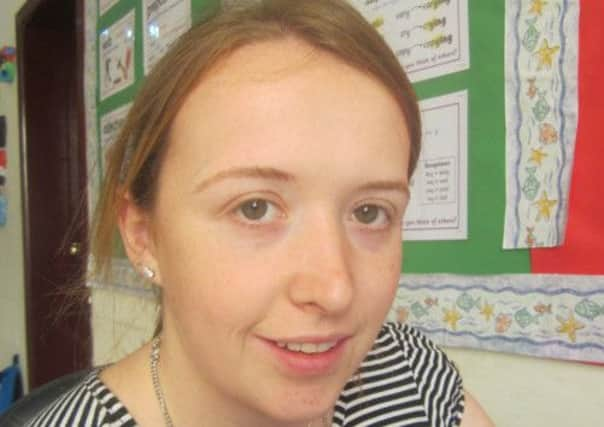Support at hand for everyday life


Ellie Wildbore is living the life she always wanted – pursuing her teaching career in the sunshine state of Qatar and enjoying a busy social life with her friends.
But a year ago all of this was just a distant dream for the 25-year-old from Nethergreen, Sheffield who was suffering a relapse in an eating disorder that had begun as a teenager.
Advertisement
Hide AdAdvertisement
Hide Ad“I’d been treated for anorexia nervosa when I was 17 and I thought that I’d overcome the condition, but then a year ago it came back. I recognised that I needed help and support,” says Ellie.
She was struggling to eat and her weight had fallen to an unhealthy seven stone.
Ellie had treatment for a year at Sheffield Health and Social Care NHS Foundation Trust’s day service – part of the Eating Disorders Service at St George’s Community Health Centre in Winter Street, Sheffield, and at Riverdale Grange in Ranmoor.
The day service is a specialist facility for people who have anorexia nervosa, bulimia nervosa or mixed eating disorder symptoms.
It is the only service of its kind in the region.
Advertisement
Hide AdAdvertisement
Hide AdService users are helped to re-establish a normal eating pattern of regular meals and snacks.
The day service offers a range of interventions like body image work and Cognitive Behaviour Therapy (CBT) as well as everyday tasks that the majority of people take for granted, like going out in the community and buying food, to eating in public.
Cooking can also be incredibly hard for people with eating disorders and so the specialist service also runs cooking classes which can be done alone or in a team.
“When you have an eating disorder every day is a challenge,” says Ellie.
Advertisement
Hide AdAdvertisement
Hide Ad“My life was ruled by food. I couldn’t eat with friends. I struggled to cook for myself and all the time I was thinking of food. It caused so much anxiety.
“It seems like a totally small deal but I really struggled with having a family meal, but I learned coping strategies so I could get some control over the situation.”
She had one to one therapy, and group therapy to help her understand the reasons behind her eating disorder.
“As a child I’d been bullied at school and this affected my confidence and how I saw myself. Having therapy helped me to fully get to grips with issues I hadn’t fully explored in the past.”
Advertisement
Hide AdAdvertisement
Hide AdBut once she received the support she needed, Ellie started to make progress.
“I made friends with other people in the service, and I also benefitted from having a very supportive family. It was better than being in hospital as I had ongoing support and was able to face the kind of challenges around food that are part of ever day life. So there’s been ongoing support.
“Getting better is about trial and error – finding out what works for you, and taking steps to build your confidence around food.”
After a year she was well enough to apply for jobs and landed a job at a school in Qatar, fulfilling a long-standing ambition to teach overseas.
Advertisement
Hide AdAdvertisement
Hide Ad“I am now at a healthy weight. Having an eating disorder is still a struggle but I don’t let it get me down. I have more good days than bad. But I now have the life that I want and I couldn’t have done it without the support of the service.”
Ellie remains in touch with the day service and has support via email and phone, which is invaluable in enabling her to remain in employment in Qatar.
Maggie Young, clinical service manager at the Sheffield Eating Disorders Service, said: “Having a day service has led, after a year, to a 64 per cent reduction in the number of patients from Sheffield being admitted to a specialist eating disorder inpatient unit.
“The day service is suitable for those who have been accessing outpatient care but need more intensive treatment, or for those who have been inpatients but are improving and are ready to progress to the next stage of treatment.
Advertisement
Hide AdAdvertisement
Hide Ad“Care is delivered in groups by the specialist multi-disciplinary team including specialist nurses and an occupational therapist who work together very closely. Service users are encouraged to give immediate feedback on what they find helpful.”
Eating disorder day service
Sheffield’s Eating Disorder Day Service offers a more intensive level of care than the outpatient service, as service users attend three days a week over a 12 week programme and can even attend ‘top-up’ sessions if they wish. There is also opportunity for one to one work with specialists as part of the programme.
The 12 week programme can accommodate eight to 10 people at a time, ranging in age from between 16 and 65.
Anyone who is worried about eating should contact their GP in the first instance who may refer them to Sheffield Eating Disorders Service for a more severe problem.
Advertisement
Hide AdAdvertisement
Hide AdIf the problem is mild to moderate, or, at an early stage, South Yorkshire Eating Disorders Association (SYEDA) offer a range of services on a self-referral basis.
For more information visit www.shsc.nhs.uk/home